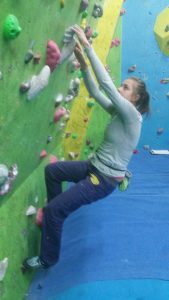It is surprising the number of candidates who are deferred on their CWA assessment and they are deferred because they have not taken responsibility for the outcome of the assessment. As soon as you start on the Instructional ladder your mind set has to change – you have to work, think, train, breath and live like an instructor. Your responsibility starts as soon as you start the training course and the CWA is the most important of all the awards as this is where we meet beginner climbers and inspire them to take it up as a lifelong sport.
- Arrive with all the equipment you will need for the assessment.

- Ensure that you do more than the minimum requirement of 15 assisted sessions to develop your toolbox of styles of delivery and practical knowledge. You should be aiming to do 3 times this amount.
- Visit climbing centres outside your local area – in other words get out of your comfort zone. There is a potential for some candidates to be site specific in their delivery with very limited experience and without the ability to adapt or respond to changing situations.
- Personally climb as much and at as many climbing centres as possible – and observe climbers around you noting potential risks and watch how other instructors work with groups.
-

Bell ringing - Assist/observe a variety of groups – birthday parties, taster sessions, children and adult instructed groups, First Steps etc. at as many different centres as possible so you can compare deliver of style and content and also centre protocol.
- Before you book your assessment ask yourself ‘Am I ready?’ Could I run a session at any centre with any type of age group? Think of possible scenarios. If there are gaps in your experience – rectify it.
- Check MT website to ensure you have covered everything on the syllabus – not all Training Courses cover everything. If you have any questions contact MT directly.
- Once you have booked your assessment it is up to you to find out what type of ‘live group’ you are likely to encounter on your assessment, the likely ratios of instructor to client, the procedures followed at that particular centre – especially for groups like birthday parties. Forewarned is forearmed. However, if you are fully prepared you will be able to cope with anything.
- If you have any questions before your assessment seek out the answers before you arrive so you can prepare in advance.
- Once you have been allocated your ‘live group’ question the instructor who will be observing you teach the group. It may be an idea to have a list of questions beforehand as assessment nerves can kick in and your mind can go blank.
- Take charge of your group immediately and be ready to adapt the session if or when necessary.
- Come prepared with an ‘interesting’ 5 minute talk that is going to engage the assessor and possibly inspire. Winging it on the spot rarely goes well. Having props that you have obviously prepared in advance shows dedication and planning. And make sure it is 5 minutes!!!

- And finally try and do the BMC Fundamentals course before you book your assessment – it will help with coaching and confidence. Movement skills should take up 25% of the training and assessment.
Your assessment should be an enjoyable learning experience as well as an evaluation process IF you have a good Assessor
If you have any questions, would like further information or would like to book a half day ‘Am I ready for Assessment course’ please contact Ali via alikat65650@hotmail.com or complete a ‘Contact Form’.
